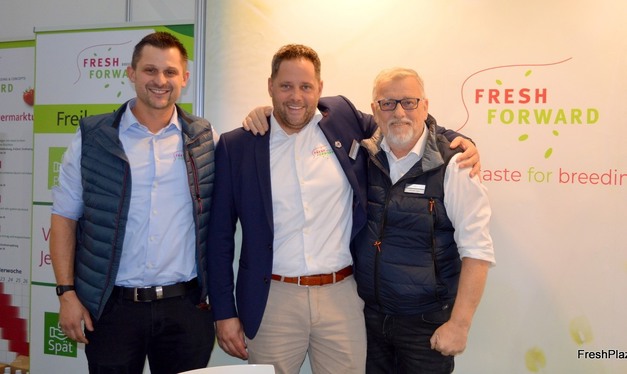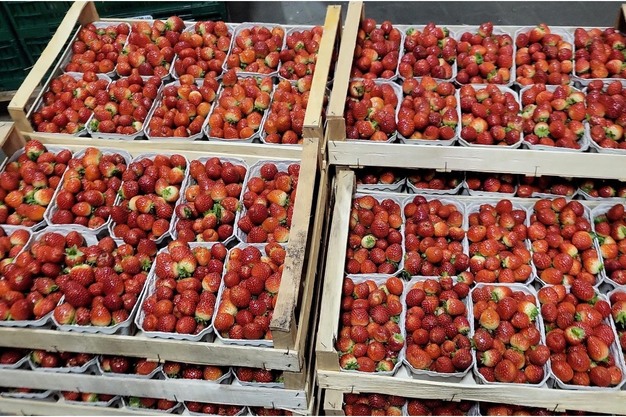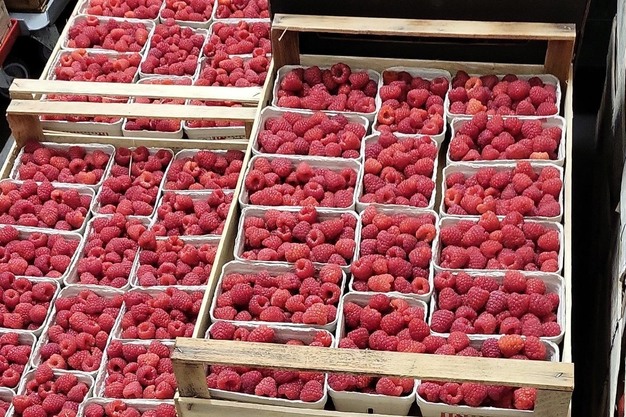This year's berry season is now finally drawing to a close. "The last batches of this year's raspberry harvest are currently being marketed, while we expect to be able to offer smaller quantities of Hademar and Marona on racks for about another week. With raspberries in particular, it is clear that the air is slowly but surely running out. The plants have been picked empty, and there is a lack of light and sun, although temperatures will reach almost 20 degrees this week,' says Jörg Huber, a fruit grower based in Achern (near Oberkirch).
Overall, the season has been long and almost frost-free. 'We had a similar season in 2011, when we were also able to harvest good Clery strawberries from autumn blossoms until November and December,' recalls Huber, who supplies both food retailers and wholesalers. The wet and cold weather has, as is well known, posed challenges for the berry sector, although sales have been encouraging throughout the season. 'We had the advantage of being able to deliver appealing qualities with firm, beautifully coloured fruits right up to the end.'

Jörg Huber (left) and his colleagues from Fresh Forward at this year's expoSE in Karlsruhe.
Receptive market for late berries
Another factor was the slow start to the season in the major growing areas in the Mediterranean region. Huber: 'Due to the wet weather, there were fewer stable raspberries than usual in Spain and Portugal. When it comes to strawberries, the supply of Greek strawberries is now slowly picking up. However, Greek produce is still being sold at quite high prices in November, which is why domestic fruit can keep up well in terms of price. It should also be noted that demand drops sharply from mid-October. However, this is not necessarily a disadvantage for us: due to the favourable supply situation, this lower demand can be largely covered by domestic produce. The short transport distances, coupled with the good quality, are playing right into our hands.' In general, Huber has observed that demand for berries decreases noticeably after the domestic season comes to an end.

The last strawberries on racks of this year's season: the weather was better for growing berries in November than in October.
Changing strawberry cultivation
Due to the weather, the 2024 growing year was quite challenging, with a consistently pleasing marketing situation, Huber summarises further. 'It felt like there were fewer promotional campaigns for strawberries than in other years. With raspberries, the wholesale markets in particular grew a lot of produce, which contributed to steady sales.'
As a close partner of the Dutch breeding company Fresh Forward, Huber carries out several variety trials every year. In the case of strawberries, so-called remontant varieties have been attracting more attention for several years. 'In the short to medium term, we will see which varieties prove themselves in practice and which do not. In terms of strawberries, we are a classic open-field farm. However, we are endeavouring to replace our existing open-field capacities with tunnel systems in the coming years, little by little,' he concludes.

Jörg Huber grows raspberries and cherries on around one hectare each. Most recently, the raspberry varieties Mapema, Kweli, Enrosadira and Clarita were offered. Wholesale prices were around 12 EUR/kg.
Photo credit: Huberhof - Önsbach
For more information:
Jörg Huber
Huberhof- Önsbach
Tel: +39 7841 67 30 128
Tel: +39 7841 60 15 707
Email: [email protected]
www.huberhof-baden.de
